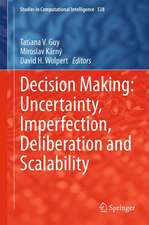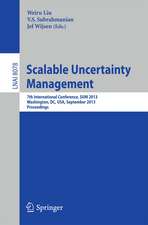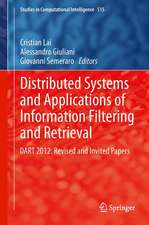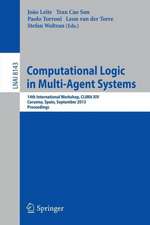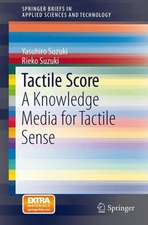Decision Making and Imperfection: Studies in Computational Intelligence, cartea 474
Editat de Tatiana V. Guy, Miroslav Karny, David Wolperten Limba Engleză Hardback – 2 feb 2013
The book is a joint effort of the top researchers from different disciplines to identify sources of imperfection and ways how to decrease discrepancies between the prescriptive theory and real-life DM. The contributions consider:
· how a crowd of imperfect decision makers outperforms experts' decisions;
· how to decrease decision makers' imperfection by reducing knowledge available;
· how to decrease imperfection via automated elicitation of DM preferences;
· a human's limited willingness to master the available decision-support tools as an additional source of imperfection;
· how the decision maker's emotional state influences the rationality; a DM support of edutainment robot based on its system of values and respecting emotions.
The book will appeal to anyone interested in the challenging topic of DM theory and its applications.
| Toate formatele și edițiile | Preț | Express |
|---|---|---|
| Paperback (1) | 640.84 lei 6-8 săpt. | |
| Springer Berlin, Heidelberg – 7 mar 2015 | 640.84 lei 6-8 săpt. | |
| Hardback (1) | 645.97 lei 6-8 săpt. | |
| Springer Berlin, Heidelberg – 2 feb 2013 | 645.97 lei 6-8 săpt. |
Din seria Studies in Computational Intelligence
- 20%
 Preț: 449.37 lei
Preț: 449.37 lei - 20%
 Preț: 1158.26 lei
Preț: 1158.26 lei - 20%
 Preț: 986.66 lei
Preț: 986.66 lei - 20%
 Preț: 1452.76 lei
Preț: 1452.76 lei - 20%
 Preț: 168.78 lei
Preț: 168.78 lei - 18%
 Preț: 1112.30 lei
Preț: 1112.30 lei - 20%
 Preț: 565.38 lei
Preț: 565.38 lei - 20%
 Preț: 649.28 lei
Preț: 649.28 lei - 20%
 Preț: 1047.73 lei
Preț: 1047.73 lei - 20%
 Preț: 1578.96 lei
Preț: 1578.96 lei - 20%
 Preț: 643.50 lei
Preț: 643.50 lei - 20%
 Preț: 657.49 lei
Preț: 657.49 lei - 20%
 Preț: 993.28 lei
Preț: 993.28 lei - 20%
 Preț: 990.80 lei
Preț: 990.80 lei - 20%
 Preț: 989.96 lei
Preț: 989.96 lei - 20%
 Preț: 1165.69 lei
Preț: 1165.69 lei - 20%
 Preț: 1444.52 lei
Preț: 1444.52 lei - 20%
 Preț: 1041.96 lei
Preț: 1041.96 lei - 20%
 Preț: 1047.73 lei
Preț: 1047.73 lei - 20%
 Preț: 1046.06 lei
Preț: 1046.06 lei - 18%
 Preț: 2500.50 lei
Preț: 2500.50 lei - 20%
 Preț: 989.13 lei
Preț: 989.13 lei - 20%
 Preț: 1165.69 lei
Preț: 1165.69 lei - 20%
 Preț: 1164.05 lei
Preț: 1164.05 lei - 20%
 Preț: 1042.79 lei
Preț: 1042.79 lei - 20%
 Preț: 1460.19 lei
Preț: 1460.19 lei - 18%
 Preț: 1403.52 lei
Preț: 1403.52 lei - 18%
 Preț: 1124.92 lei
Preț: 1124.92 lei - 20%
 Preț: 1039.47 lei
Preț: 1039.47 lei - 20%
 Preț: 1008.11 lei
Preț: 1008.11 lei - 20%
 Preț: 1045.25 lei
Preț: 1045.25 lei - 20%
 Preț: 1275.42 lei
Preț: 1275.42 lei - 20%
 Preț: 1040.32 lei
Preț: 1040.32 lei - 20%
 Preț: 988.32 lei
Preț: 988.32 lei - 20%
 Preț: 1169.79 lei
Preț: 1169.79 lei - 20%
 Preț: 1162.37 lei
Preț: 1162.37 lei - 20%
 Preț: 1059.26 lei
Preț: 1059.26 lei - 20%
 Preț: 1164.05 lei
Preț: 1164.05 lei - 20%
 Preț: 1166.52 lei
Preț: 1166.52 lei - 20%
 Preț: 1459.38 lei
Preț: 1459.38 lei - 18%
 Preț: 1005.74 lei
Preț: 1005.74 lei - 20%
 Preț: 997.38 lei
Preț: 997.38 lei - 20%
 Preț: 1055.94 lei
Preț: 1055.94 lei - 20%
 Preț: 1284.47 lei
Preț: 1284.47 lei - 20%
 Preț: 994.08 lei
Preț: 994.08 lei - 20%
 Preț: 1048.72 lei
Preț: 1048.72 lei - 20%
 Preț: 1066.02 lei
Preț: 1066.02 lei - 20%
 Preț: 943.78 lei
Preț: 943.78 lei - 20%
 Preț: 1173.10 lei
Preț: 1173.10 lei - 20%
 Preț: 1457.72 lei
Preț: 1457.72 lei
Preț: 645.97 lei
Preț vechi: 807.46 lei
-20% Nou
Puncte Express: 969
Preț estimativ în valută:
123.62€ • 128.28$ • 103.33£
123.62€ • 128.28$ • 103.33£
Carte tipărită la comandă
Livrare economică 15-29 martie
Preluare comenzi: 021 569.72.76
Specificații
ISBN-13: 9783642364051
ISBN-10: 3642364055
Pagini: 204
Ilustrații: XV, 187 p. 72 illus., 24 illus. in color.
Dimensiuni: 155 x 235 x 17 mm
Greutate: 0.43 kg
Ediția:2013
Editura: Springer Berlin, Heidelberg
Colecția Springer
Seria Studies in Computational Intelligence
Locul publicării:Berlin, Heidelberg, Germany
ISBN-10: 3642364055
Pagini: 204
Ilustrații: XV, 187 p. 72 illus., 24 illus. in color.
Dimensiuni: 155 x 235 x 17 mm
Greutate: 0.43 kg
Ediția:2013
Editura: Springer Berlin, Heidelberg
Colecția Springer
Seria Studies in Computational Intelligence
Locul publicării:Berlin, Heidelberg, Germany
Public țintă
ResearchCuprins
Dynamic Bayesian Combination of Multiple Imperfect Classifiers.- Distributed Decision Making by Categorically-Thinking Agents.- Automated Preference Elicitation for Decision Making.- Counter-Factual Reinforcement Learning: How To Model Decision-Makers that Anticipate the Future.- Effect of Emotion and Personality on Deviation from Purely Rational Decision-Making.- An Adversarial Risk Analysis Model for an Autonomous Imperfect Decision Agent.
Textul de pe ultima copertă
Decision making (DM) is ubiquitous in both natural and artificial systems. The decisions made often differ from those recommended by the axiomatically well-grounded normative Bayesian decision theory, in a large part due to limited cognitive and computational resources of decision makers (either artificial units or humans). This state of a airs is often described by saying that decision makers are imperfect and exhibit bounded rationality. The neglected influence of emotional state and personality traits is an additional reason why normative theory fails to model human DM process.
The book is a joint effort of the top researchers from different disciplines to identify sources of imperfection and ways how to decrease discrepancies between the prescriptive theory and real-life DM. The contributions consider:
· how a crowd of imperfect decision makers outperforms experts' decisions;
· how to decrease decision makers' imperfection by reducing knowledge available;
· how to decrease imperfection via automated elicitation of DM preferences;
· a human's limited willingness to master the available decision-support tools as an additional source of imperfection;
· how the decision maker's emotional state influences the rationality; a DM support of edutainment robot based on its system of values and respecting emotions.
The book will appeal to anyone interested in the challenging topic of DM theory and its applications.
.
The book is a joint effort of the top researchers from different disciplines to identify sources of imperfection and ways how to decrease discrepancies between the prescriptive theory and real-life DM. The contributions consider:
· how a crowd of imperfect decision makers outperforms experts' decisions;
· how to decrease decision makers' imperfection by reducing knowledge available;
· how to decrease imperfection via automated elicitation of DM preferences;
· a human's limited willingness to master the available decision-support tools as an additional source of imperfection;
· how the decision maker's emotional state influences the rationality; a DM support of edutainment robot based on its system of values and respecting emotions.
The book will appeal to anyone interested in the challenging topic of DM theory and its applications.
.
Caracteristici
Latest research on Decision Making and Imperfection Results of the a workshop Decision Making with Multiple Imperfect Decision Maker shield in conjunction with the 25th Annual Conference on Neural Information Processing Systems (NIPS 2011) December 16-17, 2011, Sierra Nevada, Spain Written by leading experts in the field











